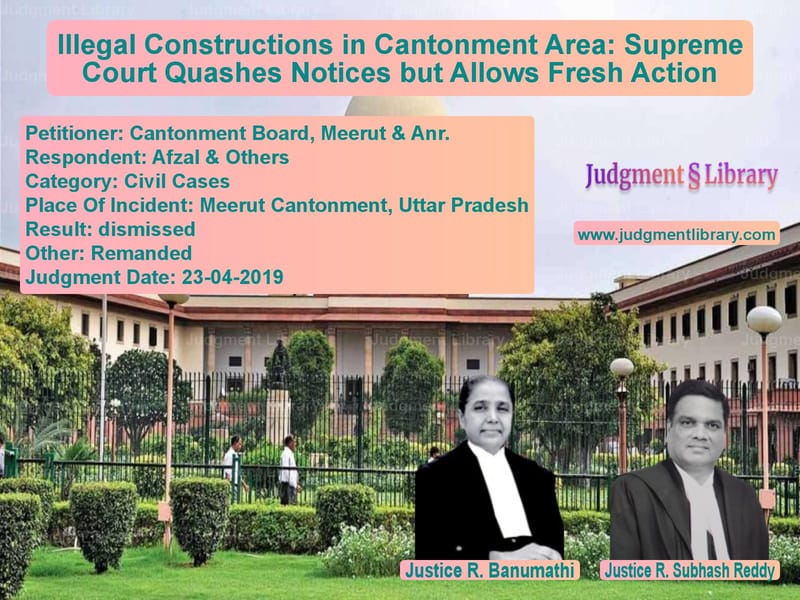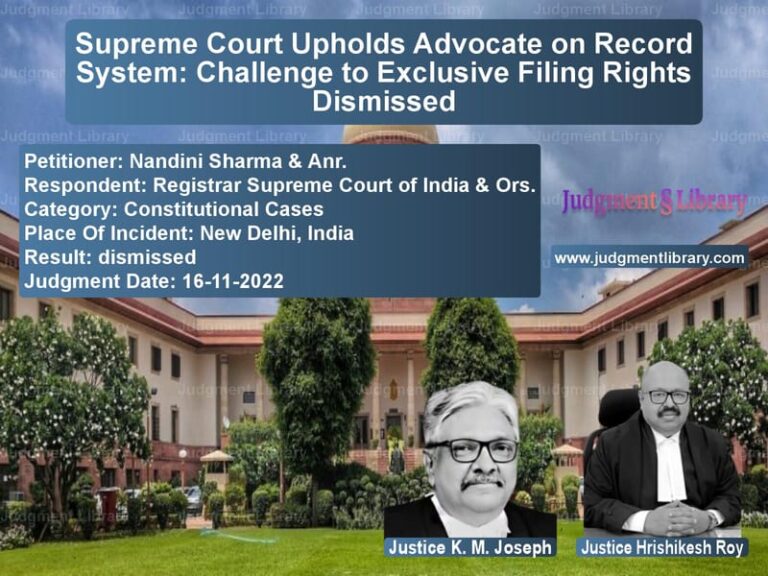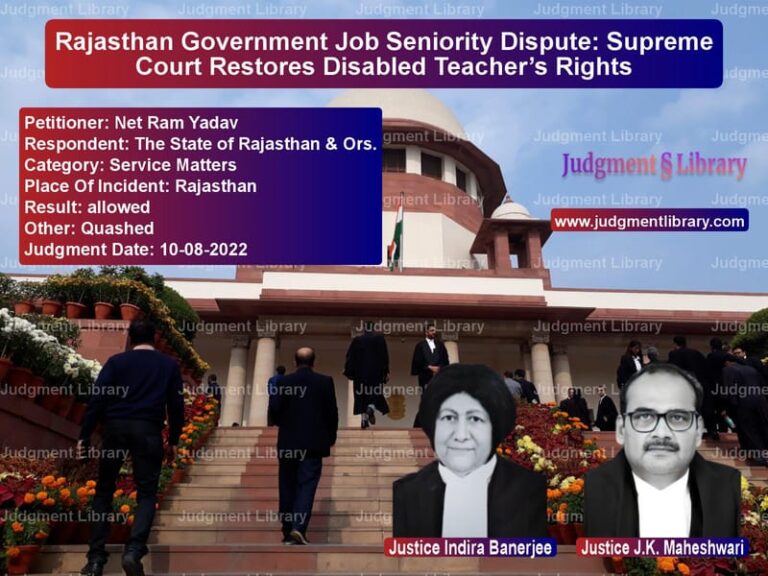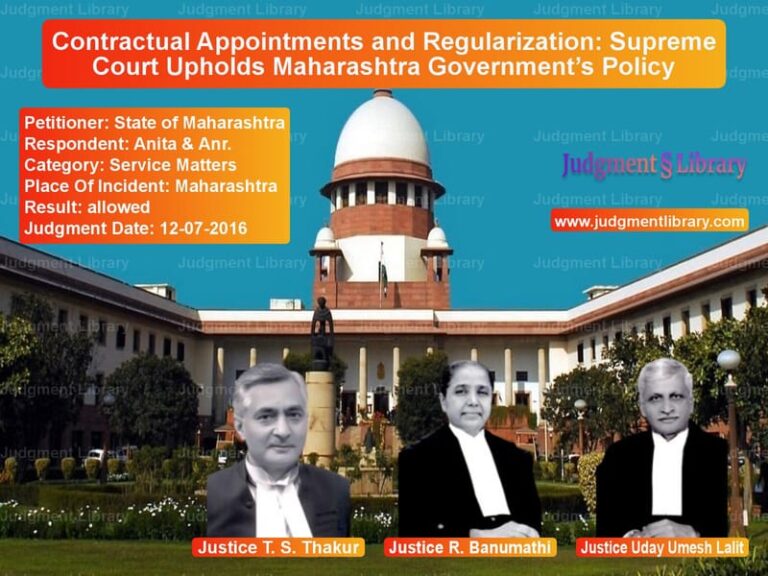Illegal Constructions in Cantonment Area: Supreme Court Quashes Notices but Allows Fresh Action
The Supreme Court of India has ruled in favor of property owners in Meerut Cantonment, setting aside demolition notices issued under the Cantonments Act, 1924. The judgment, while granting relief to the affected parties, also allowed the Cantonment Board to initiate fresh proceedings under the Cantonments Act, 2006, if necessary.
Background of the Case
The case concerns a group of property owners in the Meerut Cantonment area who were issued notices by the Cantonment Executive Officer (CEO) under Sections 184 and 185 of the Cantonments Act, 1924. These notices alleged unauthorized constructions and ordered their demolition.
The affected individuals, led by Afzal (the primary respondent in the case), challenged these notices before the High Court of Allahabad. They argued that the notices were issued without proper authority and that their objections were not adequately considered.
The High Court ruled in favor of the property owners, quashing the demolition notices and setting aside the orders of the appellate authority. However, it left open the possibility for the Cantonment Board to initiate fresh proceedings following the correct legal procedure.
Aggrieved by this decision, the Cantonment Board, Meerut, approached the Supreme Court.
Key Issues in the Case
- Whether the Cantonment Board had the authority to issue demolition notices under the Cantonments Act, 1924.
- Whether the notices were issued without following due process.
- Whether the appellate authority’s orders were legally sustainable.
- Whether the High Court was correct in quashing the notices and allowing fresh proceedings.
Arguments Before the Supreme Court
Appellants’ Contentions (Cantonment Board, Meerut):
- The Cantonment Board argued that the constructions were unauthorized and carried out without prior permission.
- They contended that the notices were legally issued under the Cantonments Act, 1924, which was applicable at the time.
- They claimed that despite multiple opportunities, the respondents failed to appear before the appellate authority, justifying the dismissal of their appeals.
- They argued that the High Court should not have interfered with the Board’s authority in maintaining order in the cantonment area.
Respondents’ Counterarguments (Property Owners):
- The respondents contended that the demolition notices were issued mechanically and in a casual manner without considering their objections.
- They argued that the notices did not mention the date of construction, making them vague and unenforceable.
- They asserted that the appellate authority passed orders in a stereotypical manner without considering individual cases.
- They challenged the authority of the Cantonment Executive Officer, arguing that he lacked the jurisdiction to issue the notices.
Supreme Court’s Observations
The Supreme Court examined the validity of the notices, the process followed by the authorities, and the High Court’s ruling. It made several key observations:
- “The High Court was correct in finding that the notices were issued without proper application of mind.”
- “The appellate authority’s orders were identical and lacked independent reasoning, indicating a lack of proper consideration.”
- “While the Board has the authority to regulate unauthorized constructions, it must do so in compliance with due process.”
- “As the Cantonments Act, 2006, came into force after the notices were issued, any future action must be taken under the new law.”
The Court acknowledged the need to maintain discipline in cantonment areas but emphasized the importance of following legal procedures.
Final Judgment
The Supreme Court upheld the High Court’s decision to quash the demolition notices and set aside the appellate authority’s orders. However, it granted liberty to the Cantonment Board to initiate fresh proceedings under the Cantonments Act, 2006.
The Court stated:
“While the High Court rightly set aside the impugned notices, it has also correctly allowed the Cantonment Board to proceed afresh following the correct procedure. Any fresh action must be taken under the Cantonments Act, 2006, with due regard to the respondents’ rights.”
Conclusion
This judgment reinforces the principle that administrative authorities must adhere to due process while exercising their regulatory powers. While it provides relief to property owners, it also ensures that unauthorized constructions in cantonment areas are not legitimized without scrutiny. The ruling serves as a precedent for similar disputes concerning municipal regulations and land use in protected areas.
Petitioner Name: Cantonment Board, Meerut & Anr..Respondent Name: Afzal & Others.Judgment By: Justice R. Banumathi, Justice R. Subhash Reddy.Place Of Incident: Meerut Cantonment, Uttar Pradesh.Judgment Date: 23-04-2019.
Don’t miss out on the full details! Download the complete judgment in PDF format below and gain valuable insights instantly!
Download Judgment: Cantonment Board, Me vs Afzal & Others Supreme Court of India Judgment Dated 23-04-2019.pdf
Direct Downlaod Judgment: Direct downlaod this Judgment
See all petitions in Property Disputes
See all petitions in Landlord-Tenant Disputes
See all petitions in Damages and Compensation
See all petitions in Judgment by R. Banumathi
See all petitions in Judgment by R. Subhash Reddy
See all petitions in dismissed
See all petitions in Remanded
See all petitions in supreme court of India judgments April 2019
See all petitions in 2019 judgments
See all posts in Civil Cases Category
See all allowed petitions in Civil Cases Category
See all Dismissed petitions in Civil Cases Category
See all partially allowed petitions in Civil Cases Category







